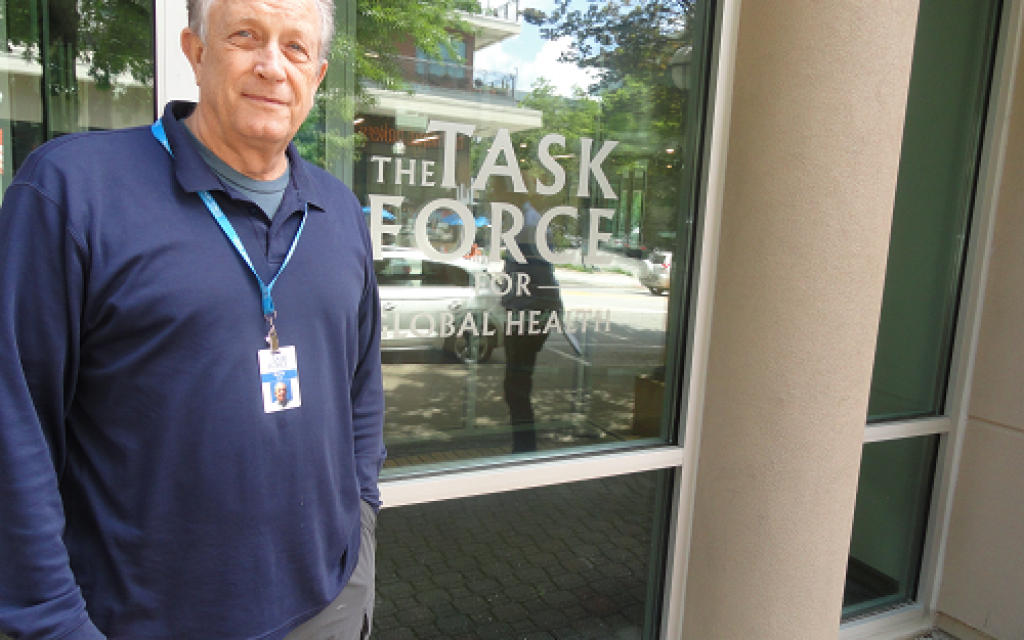Health Task Force Tackles Big Problems
Dr. David Ross, is the recipient of the 2018 Georgia Commission on the Holocaust Humanitarian Award.
The Task Force for Global Health, established in 1984, is the country’s second largest nonprofit organization, working on access to medicines and vaccines, field epidemiology, health workforce development, and neglected tropical diseases. CEO Dr. David Ross, recipient of the 2018 Georgia Commission on the Holocaust Humanitarian Award, met with the Atlanta Jewish Times in his Decatur office.
AJT: What does the Task Force do?
Ross: We eliminate difficult, debilitating diseases that affect lots of people, and right now that clusters around neglected tropical diseases (NTDs). We also strengthen the systems that make health possible. It almost always involves building various partnerships, collaborative enterprises, acting as a secretariat.
Our disease programs – blinding trachoma, river blindness, lymphatic filariasis, intestinal worms, schistosomiasis, leprosy – all involve convening a number of different partners and stakeholders who are trying to eliminate those diseases. And that involves bringing in the (pharmaceutical) drug companies – they donate the drug. We convene expert scientific panels that decide which countries need those drugs, and how much. They continually work with us to monitor progress towards the goal. We are about measured progress to the end; we want to see end results. We also oversee, in the case of NTDs, the distribution of research monies to understand the problems or barriers that are getting in the way of elimination.
Get The AJT Newsletter by email and never miss our top stories Free Sign Up
There is a lot of different research activity going on that we help fund, using funders’ money like the Gates Foundation, USAID, and UK Aid Direct. We are guiding the money to researchers, bringing those results back and sharing it with the world’s community so that you make progress in the implementation activities it takes to eliminate a disease. That’s the NTD side. We also do it on the infections side; we are one of the key partners in the eradication of polio.
Another side is what we call health systems strengthening. That means training the workforce, the field epidemiologists, or disease detectives. Every country should have what we have here in the US: a local health department, a state health department at the national level and the ability to detect emerging diseases and respond to those threats. We don’t have runaway disease outbreaks in this country for a reason; we have an infrastructure system, so we are helping build that capacity all over the world.
One of our big things in Kenya now that’s starting to morph to other countries is the systematizing, licensing and credentialing of medical professions, so that they (can identify) the doctors, pharmacists, nurses, radiologists, lab techs, etc. They didn’t know that before. Now they are able to use their own donor money and country aid to plug the holes and develop their workforce.
AJT: What is most challenging about your position?
Ross: We have a legacy at the Task Force now that has evolved over time of actually tackling big problems and solving them on a very large scale. But there is always a hesitancy. People want to go small, ‘lets chip away at the problem’ when in fact sometimes it’s OK to envision the big problem and solve it. For example, we recently took on, as the secretariat, the global partnership for zero leprosy. What we are doing is helping the world’s leprosy community, nonprofits and groups in every country where leprosy exists to understand that we can actually put our shoulders together and eliminate the disease. This biblical disease that seems to always be here can be eliminated. There is a pathway to doing that. It’s not just fantasy, there is a way to get there. Each one of the blocks of efforts we are working on, whether it’s a tropical disease or strengthening health systems, (helps to) build field epidemiology capacity and stop future Ebola outbreaks, or across Latin America, (where we trained) 1000 front line workers how to detect and respond to Zika outbreaks in their communities.
AJT: What else should people know about the Task Force?
Ross: We are a well kept secret, but that’s because we put the interests of the work and the partnerships ahead of promotion. Investing in us is an investment in improving health around the world. Atlanta has assets in global health that nobody else has, and we really should be understood by the world as the global health city.





comments